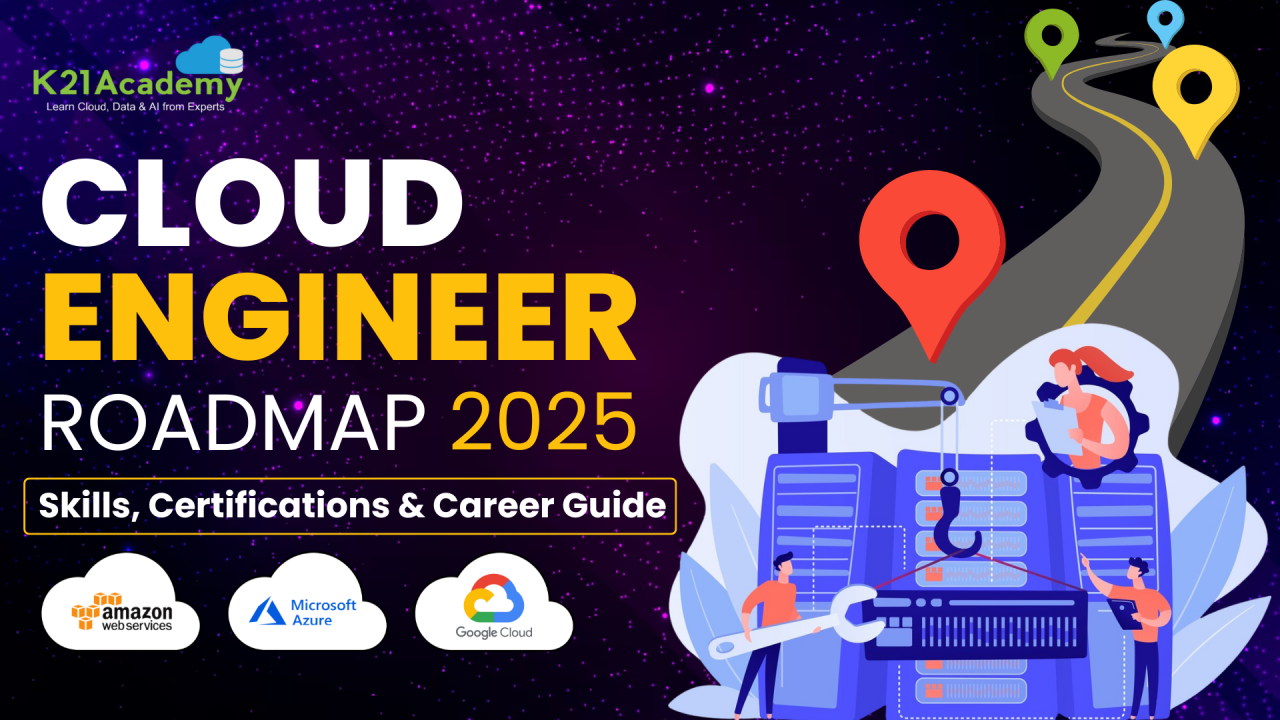The tech world is buzzing, and it's not just about new gadgets. Everyone's asking: will AI take my job? For Cloud Engineers, this question hits particularly close to home. With AI getting smarter by the day, it's natural to wonder about the future of managing those vast digital infrastructures.
Think of it this way: AI can handle some repetitive tasks, like a super-fast assistant. But what about the creative problem-solving and strategic thinking that Cloud Engineers bring to the table? We'll explore exactly which parts of your job might see AI collaboration and which areas will always need a human touch. Get ready to sort fact from fiction.
Explore this post with:
Table of contents
Cloud Engineers: Partners or Priced Out by AI?
Cloud engineers are feeling a mix of excitement and concern about AI's growing presence in their field. Many see AI not as a job threat, but as a collaborative tool that can automate routine tasks, allowing them to focus on more creative work. A Gartner report suggests that while AI will take over routine monitoring and optimization, engineers will still be needed for high-level design and strategic decisions.
However, some voices in the community express concern about job security, especially for those in more traditional roles. A recent survey found that while many cloud engineers feel they need to adapt their skills, they worry that newer professionals who are more adept at integrating AI may outpace them. Yet, seasoned engineers argue that their nuanced problem-solving skills and creativity are irreplaceable, emphasizing that AI lacks the human touch necessary for complex decision-making.
In summary, the consensus is leaning towards AI augmenting the role of cloud engineers, rather than outright replacement. This sentiment is echoed in discussions about evolving job functions and the emergence of new roles, such as AI/ML engineers, that require a blend of skills. As the landscape shifts, cloud engineers who embrace change and prioritize continuous learning will likely thrive.
What parts of Cloud Engineer is AI replacing?
AI is making significant strides in automating various aspects of cloud engineering. One of the key areas is infrastructure provisioning, where AI can handle the deployment and scaling of cloud resources. This automation reduces manual configuration, as discussed in the Cloud Infrastructure Management in the Age of AI Agents. AI-driven tools are also excelling in monitoring and maintenance, continuously checking cloud systems for performance and security issues, thus enabling proactive maintenance.
Another domain being transformed by AI is cost optimization. By analyzing usage patterns, AI can recommend cost-saving measures and automate resource allocation to optimize expenses, as highlighted in AI-Enhanced Cloud Automation: A Framework for Next-Generation Infrastructure Management. Moreover, AI systems can engage in incident response, identifying and resolving issues faster than human engineers, which simplifies the troubleshooting process.
What parts of Cloud Engineer AI cannot replace
Cloud Engineers bring unique human skills to the table that AI currently can't match. For instance, interpersonal skills are crucial as Cloud Engineers frequently collaborate with different teams and stakeholders. According to a TechTarget article, these relationship-building skills are essential for successful project execution, a realm where AI struggles.

Credits: sdecoret - stock.adobe.com
Another area where Cloud Engineers hold their ground is in complex problem-solving. Designing and implementing cloud solutions often requires a nuanced understanding and creativity that AI doesn't yet possess. Additionally, as noted in Quora discussions, while AI can automate many tasks, the strategic thinking needed to align cloud strategies with business goals still demands the human touch.
Lastly, the ethical dimension of decision-making in cloud engineering is not something AI can navigate effectively. As data privacy and security concerns grow, human oversight becomes even more important. As highlighted in Harvard Business Review, ethical considerations in handling sensitive information ensure that Cloud Engineers remain an integral part of the industry landscape.
How Cloud Engineers Can Adapt to the AI Era
The role of Cloud Engineers is evolving, especially as organizations increasingly embrace AI technologies. They must now understand how to integrate AI tools and services into cloud architectures. According to a recent AWS blog, familiarity with AI frameworks can greatly enhance Cloud Engineers' ability to design systems that improve efficiency and performance.

Credits: Atul Kumar
To stay competitive, Cloud Engineers should focus on learning skills such as automation through DevOps practices and enhancing their data management and analytics capabilities. As noted in the Cloud Engineer Roadmap 2025, cloud professionals should also consider gaining expertise in AI/ML integration and security protocols, ensuring they remain aligned with emerging technologies and industry demands.
Cloud Engineer Hiring Trends in the US
The job market for Cloud Engineers in the U.S. remains vibrant, showcasing sustained demand. According to LinkedIn's recent data, over 16,000 Cloud Engineer positions were posted in just the past week, indicating active hiring. Overall, there are more than 67,000 Cloud Engineer jobs currently available across the country.
This strong market is fueled by businesses migrating to cloud services, creating varied opportunities. While most roles are full-time, a significant number of positions - over 11,320 - offer remote work arrangements, reflecting evolving workplace flexibility. Employers are looking for professionals with skills in major platforms like AWS, Microsoft Azure, and Google Cloud, alongside automation tools such as Terraform and Ansible, as highlighted by Motion Recruitment's 2025 guide and LinkedIn insights.
The market also shows a shift towards specialized roles, including Cloud Security Specialists and AI + Cloud Engineers. LinkedIn's analysis for 2025 suggests that pairing certifications with practical, hands-on experience and an understanding of business implications will help candidates stand out. The projected 14% annual job growth for cloud computing roles further underscores the positive outlook for this field, according to Motion Recruitment.
Is Cloud Engineer AI safe?
In the ever-evolving tech landscape, the role of a Cloud Engineer appears to be more resilient to AI takeover than you might think. According to recent insights from Medium, AI is unlikely to replace cloud engineers but rather enhance their value. AI excels at automating routine tasks like monitoring and optimization, allowing engineers to focus on design, strategy, and problem-solving, which demand human judgment and creativity.

Credits: Digital Cloud Training
AI and Cloud Engineering are becoming collaborative partners rather than competitors. As detailed in Digital Cloud Training, AI is expected to take over mundane tasks, freeing up engineers for complex decision-making and system design. This shift emphasizes the importance of continuous learning and adaptation, as cloud engineers will need to understand AI tools and integrate them into their workflows effectively.
The consensus across multiple sources, including Lemon.io, is clear: while AI will change the nature of cloud engineering tasks, it will not replace the human element. Engineers' roles will evolve, embracing new technologies and methodologies that AI introduces, ensuring a future where AI supports rather than supplants human expertise.
Recruiter's guide to hiring Cloud Engineers
Hiring a Cloud Engineer in the AI era requires a keen eye for both technical and soft skills. Start by looking for candidates with knowledge in major cloud platforms like AWS, Azure, or Google Cloud. Familiarity with Infrastructure as Code (IaC) tools such as Terraform is a plus. Effective communication and adaptability to new technologies are just as important, ensuring the candidate can work well with cross-functional teams.
Utilize Adaface's Prompt Engineering Test to screen candidates on their ability to craft effective prompts for AI models, an increasingly valuable skill in cloud roles. The Generative AI Test is another tool to evaluate how candidates handle AI and machine learning models. Additionally, the Cloud Computing Online Test can help ensure your candidates possess the necessary cloud platform expertise and technical proficiency.
Prompt Engineering Test
Generative AI Test
Cloud Computing Online Test
A Bright Future for Cloud Engineers with AI
Looking ahead, AI is not just a new tool; it’s a game-changer for cloud engineers! The integration of AI will allow professionals to shift their focus from mundane tasks to innovative problem-solving. With AI managing routine monitoring and optimization, engineers can channel their creativity into designing more efficient systems and exploring exciting new technologies. As highlighted in recent research, this collaborative relationship will make cloud engineering roles more dynamic than ever.
For those hiring cloud engineers, the landscape is equally bright. The demand for skilled professionals who can navigate AI-powered tools and provide human oversight will only grow. Companies will benefit from engineers who can harness AI to enhance cloud services, leading to better performance and cost savings. The future promises a vibrant job market where engineers who embrace AI and upskill will lead the charge in shaping the next evolution of technology!

40 min skill tests.
No trick questions.
Accurate shortlisting.
We make it easy for you to find the best candidates in your pipeline with a 40 min skills test.
Try for freeRelated posts



